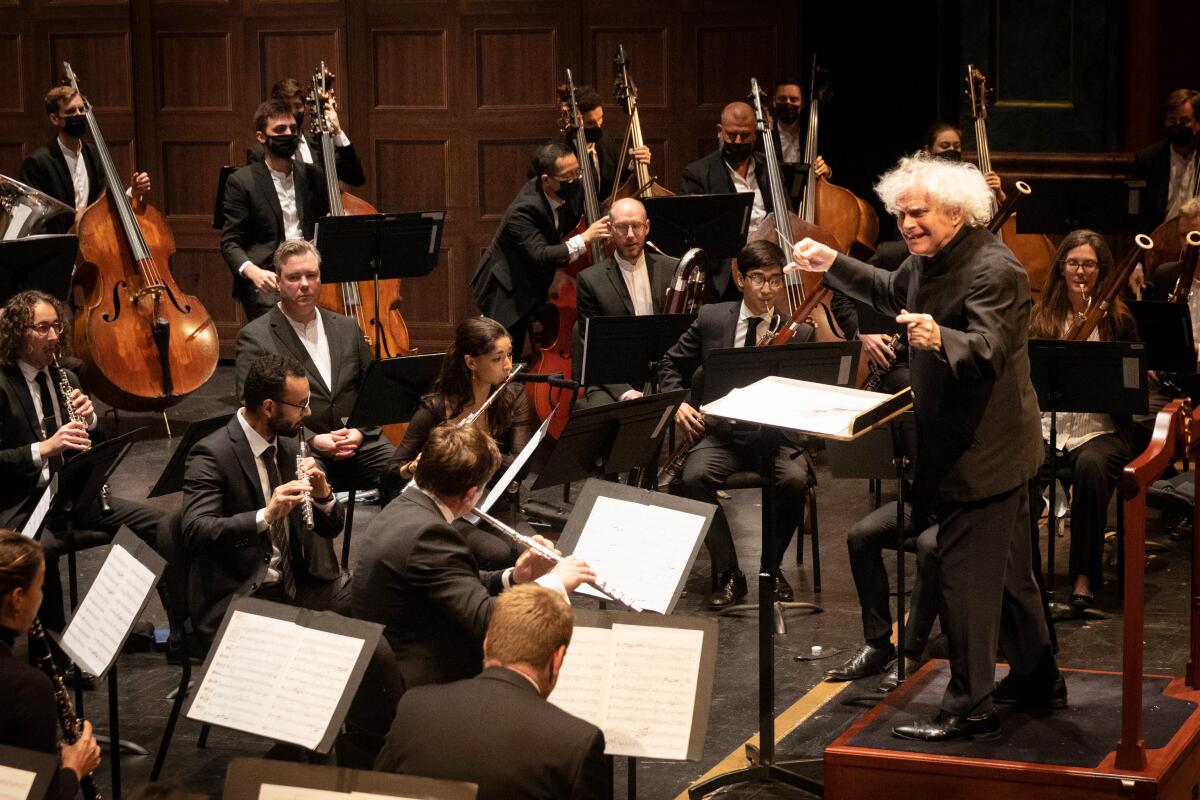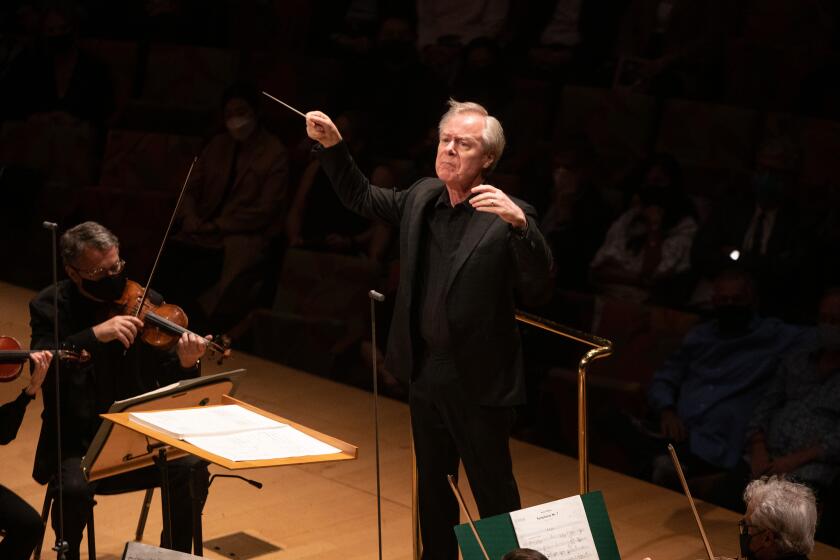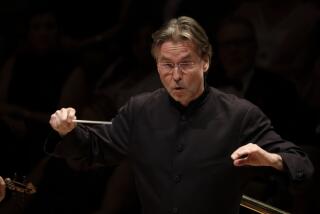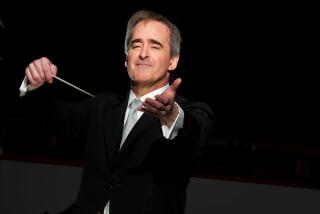Review: Santa Barbara music students, Simon Rattle and the London Symphony make for joyous revelation

The Music Academy of the West in Santa Barbara has a wonderful tradition of presenting a community concert each summer, with all seats $10 for adults and free for young people 7 to 17 accompanied by an adult. In recent years, the concerts have been with two of the world’s most celebrated orchestras, the New York Philharmonic and the London Symphony, which have had partnerships with the Music Academy.
Wonderful in intent, but not always ideal. In summer 2017, the New York Philharmonic gave a dispiriting final concert with its outgoing music director, Alan Gilbert, at the football stadium of Santa Barbara City College. The players made it disconcertingly clear that they were eager for a summer vacation and a new music director. The venue wasn’t so hot either.
What a difference five years, the London Symphony Orchestra, Simon Rattle and the Granada Theatre make. The LSO’s residency with the Music Academy was inevitably interrupted by the pandemic, but the orchestra is again able to tour. It arrived for a week in California with concerts in the Bay Area and Costa Mesa — no L.A.! — culminating in a long weekend of events and workshops in Santa Barbara.
It ended Sunday night in high spirits, with a joyous, stupendous community event in a real concert hall celebrating the 75th anniversary of the Music Academy. The LSO was joined by a select group of the academy’s young alumni, who have had a chance to work with the orchestra in London. This had to be the best bargain in concertgoing anywhere since the Los Angeles Philharmonic’s “Benvenuto Gustavo,” the free Hollywood Bowl concert that welcomed Gustavo Dudamel as music director in 2009.
Rattle also happens to be an outgoing music director, but a beloved one. He’s on board until 2023, and most of London’s music community will be sorry to see him go. He’s accepted the music directorship of the Bavarian Radio Symphony Orchestra in Munich. In a phone conversation last month from his home in Berlin, the British conductor told me that location had a lot to do with the decision to leave London. He wants to spend more time with his family, and the German capital became home during his 16 years as music director of the Berlin Philharmonic.
But, as everyone knows, the difficulties that Brexit presents for musicians along with the failure of London to support his efforts to build a world-class concert hall in a musical capital that lacks one has everything to do with the decision.
Does the orchestra like him? Before conducting Percy Grainger’s goofy brilliant “Lincolnshire Posy,” Rattle grabbed a microphone and said that the orchestra had asked him to speak to the audience about the suite of eccentric folksong arrangements. “What orchestra ever wants to hear a conductor talk any more than they already have to?” he asked.
The orchestra also asked him to sing. “Nobody since my mother has ever asked me to sing.”
Rattle then demonstrated the outlandishly drunken folksong style that Grainger was after. “You owe me a drink, Rachel,” he said to a merrily laughing bassoonist. A good time was meant for all.
That may be a first for a concert where the main event was a big, patience-demanding Bruckner symphony. It may also be the first time anyone thought to preface Bruckner’s spiritually fulsome Fourth Symphony (“Romantic”) with Grainger’s insouciantly folksong settings. It was, furthermore, the symphony’s first U.S. performance of a new scholarly edition by Benjamin-Gunnar Cohrs that Rattle and the LSO premiered in London in September.
Joyous all of it, yes, but also, all of it musically a revelation.
Grainger made sense because his wind band music usefully employed a goodly number of winds included in the 32 young musicians, and because you can’t have too many winds in a band. Grainger made further sense because this year is the centenary of his birth. The Australian composer and pianist, who emigrated to the U.S. and who was a favorite at the Hollywood Bowl, is not getting the attention he deserves. Everything he touched, and folk tunes in particular, he turned on its head.
David Robertson steps in as a last-minute replacement for Russian conductor Semyon Bychkov, performing Mahler’s Seventh Symphony with the L.A. Phil.
Grainger’s and Bruckner’s over-the-top eccentricities turn out to be complementary. Both composers knew when to stop but didn’t always care. In “Lincolnshire Posy” and in his yo-ho-ho “Lads of Wamphray” march, which opened the program, Grainger laid it on. Harmonies go where they’re not supposed to; brass jump in with counterpoints out of the blue. Along with irrepressible revelry, though, Grainger just as easily turns rapturously sentimental. There’s a mystical sensibility as well in Grainger. Rattle called “Lincolnshire Posy” a masterpiece. He wasn’t wrong.
Bruckner’s mystical sensibility announces his Fourth. Glowing horns that sail over a bed of softly undulating strings are an invitation to wonder. Bruckner may be all seriousness, but not necessarily sober seriousness. Flabbergasting brass blasts and awe-inspiring orchestral outbursts shift to lyrical lushness in quick succession. His 19th century harmonies are as wayward as Grainger’s 20th century ones. His orchestra palette as flamboyant.
Also, like Grainger, Bruckner never left anything alone. Grainger made one version after another of many of his pieces. There are eight different editions of Bruckner’s Fourth. He took out bits, put them back differently or wrote something new.
The new edition that Rattle premiered does a little tightening up, adds a little material from earlier editions not heard in the standard Hass or Novak versions that most conductors use. An unfamiliar transition in the last movement had a stunning delicacy. But there were also old things that sounded new in Rattle’s performance, given the way he brought out inner details and his boldly imaginative dynamic range from practically inaudible to deafening.
Fifteen years ago, Rattle made a grandly traditional recording of the symphony with the Berlin Philharmonic. The LSO, no doubt enhanced by the vivacity of young players, sounded fresh and young again, full of granitic energy. Maybe you could compare it with the sensation of going from a traditional gas guzzler to a gutsy electric car. It was, at an hour, 11 minutes shorter than the Berlin recording.
Rachel wasn’t the only one in the Granada on Sunday who owed Rattle a drink. We all did.
More to Read
The biggest entertainment stories
Get our big stories about Hollywood, film, television, music, arts, culture and more right in your inbox as soon as they publish.
You may occasionally receive promotional content from the Los Angeles Times.








